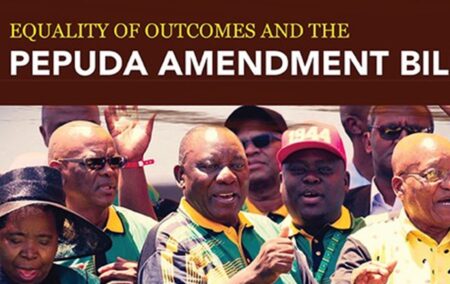Proposed amendments to the Promotion of Equality and Prevention of Unfair Discrimination Act (Pepuda) have drawn harsh criticism – including from the Institute of Race Relations (IRR) – but the government says the new measures are need to improve ‘substantive equality’.
Writing in the Daily Maverick, the spokesperson for the Department of Justice and Correctional Services, Chrispin Phiri, said the bill would place the onus not only on the state and public organisations, but also on private organisations, to promote equality and prohibit unfair discrimination.
Says Phiri: ‘The state will have to commit its budget towards these ideals. The private sector will have to uphold various sectoral codes which promote equality and seek to eliminate unfair discrimination. No one serious about justice and equality should oppose this project.’
He added that the South African labour market was skewed along racial and gender lines.
‘The Pepuda Amendment Bill, though not a panacea, can go a long way to ensuring that these types of injustices and unfair discrimination do not continue into perpetuity.
‘In spite of the aspirations of the Constitution, we cannot wish away the past or pretend that we are rebuilding South Africa on a new foundation.’
Criticism of the proposed changes has come from all quarters, with civil society and business groups warning that the bill seeks to introduce ‘idealised’ requirements to achieve its objectives.
The official opposition, the Democratic Alliance, warned that the removal of ‘intent’ could have unintended and far-reaching consequences that could result in individuals breaking the law without knowing it, or doing so without intending to.
IRR Head of Policy Research Dr Anthea Jeffery has also been a staunch critic of the bill.
She wrote last week: ‘Hard data and objective assessment over many years have shown that the “most free” countries — those that do best in avoiding excessive state intervention and upholding property rights — have average per capita GDP of some $44,000, whereas the equivalent figure in the “least free” countries is a mere $5,700. The poorest 10% of the population do far better in the “most free” countries too, having average incomes of $12,300 a person, as compared to some $1,600 in the “least free” states. Extreme poverty is also far more limited in the “most free” nations, afflicting only 1.7% of the population as opposed to 31.5% of the people in the “least free” ones.
‘The formula for inclusive prosperity, in short, is proven and well known. It is also the polar opposite of what the bill requires and the [ANC’s national democratic revolution or NDR] is seeking to achieve.’

